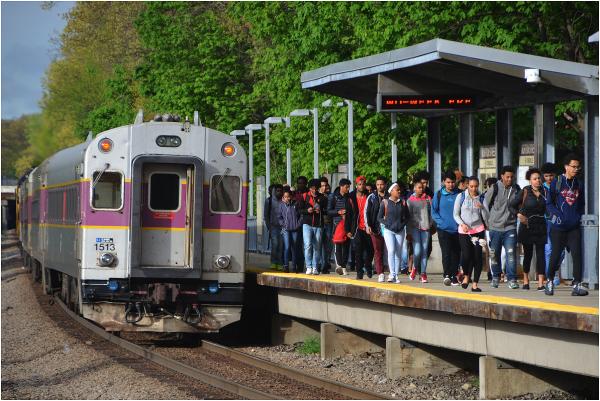August 15, 2017

Passengers on the Fairmount Line are shown at the Morton Street station in Mattapan earlier this year. Chris Lovett photo
The MBTA's Fiscal and Management Control Board has approved a commuter rail extension pilot that will run daily trains to Foxborough starting in the spring of 2019, though Boston transit advocates say T officials never made a strong case for the program to residents already living along the Fairmount Corridor.
For just under a year, the pilot would extend eight Fairmount Line trains and one Franklin Line train daily to Foxborough station. Trains already run between South Station and Foxborough for special events at Gillette Stadium home to the Robert Kraft-owned New England Patriots.
Citing open seats along the existing commuter rail routes, proponents pitched the $1.2 million pilot as a way to use excess capacity on the lines and connect residents to jobs. The Kraft Group, which stands to benefit from increased direct access to Gillette Stadium and the Patriot Place mall, is partnering with the T. The Krafts will donate 500 revenue-generating parking spots in Foxborough and have committed to pay up to $217,000 to make up the difference between subsidized per-passenger costs during the pilot.
Transit officials noted the support of businesses, elected leaders, and residents in and around Foxborough.
“A partnership like this that leverages our existing infrastructure on the commuter rail is something we should give a shot,” said acting General Manager Brian Shortsleeve. Given the strong local support from Foxborough, he said, “this sort of public-private partnership could be a real win-win for the T and for the local community.”
Critics of the pilot worry it could disrupt existing service, pack the cars before reaching Boston stations, and potentially cause backups if mechanical or logistical failures moored Foxborough trains somewhere along the line.
“They stated all this support from the communities, and none of the communities that they were referring to were communities that are impacted,” said Mela Bush-Miles with the Fairmount/Indigo Transit Coalition. “They don’t care about us and I feel that it was bold transit racism,” she said.
A recent Boston Foundation study determined the line serves some of Greater Boston’s highest density residential communities, including predominantly communities of color. The corridor is also extremely public transit-dependent with large populations of students, residents with disabilities, residents of low-income households, and older adults.
State Rep. Evandro Carvalho last week filed legislation that would require “an equity study prior to the approval of any new transportation service pilot for the Fairmount Line.”
The Foxborough pilot was approved since that filing.
The new Foxborough service would add an additional 160 daily riders across the MBTA, according to Monday’s presentation. David Mohler of MassDOT said projections show “no impact on existing ridership. Anybody who has a seat today would get a seat, and trains would basically run on the same schedule.”
When reviewing ridership counts, the MBTA’s pilot pitch did not make note of the under-construction Blue Hill Avenue Station in Mattapan, and Fairmount advocates take issue with the T’s official counts. Allentza Michel, Fairmount/Indigo Network Coordinator for the Local Initiatives Support Corporation raised the Nelson/Nygaard Consulting Associates’ finding that ridership since 2012 has tripled along the line, up to 2,257 daily boardings in June 2016.
As to the T now coming to the table with the Fairmount community, “We’re not confident,” said Michel. “They said in past presentations that they would sign the MOU and then engage stakeholders, which means that any specifics around community benefit agreements, around job standards, around any potential economic development that they continue to speak of as a matter of assumption, doesn’t hold any weight or gains for the Fairmount residents.”
Bush-Miles said this feels like a step backward on any progress toward making the Fairmount Line a more reliable rapid-transit option for those who already rely on it as “a lifeline.” On-time arrivals on the 9.2-mile Fairmount are regularly at 97 percent, she said, with four new stations resulting from years of advocacy. “You’re talking about giving all of this that we’ve worked for to Foxborough,” she said.
The pilot was finally approved in a 4-1 vote, to start in spring 2019, with several conditions attached. Every month, the control board expects to be briefed on the pilot, including ridership counts and on the reliability of the Fairmount Line. Cost beyond pilot projections would be shared by the T and its partners, Transportation Secretary Stephanie Pollack said.
Monica Tibbits-Nutt, the only board member who voted in opposition to the pilot, was skeptical about the project as an economic booster.
“The proponents come forward and say it’s about economic development,” she said. “It’s good for those businesses, it’s good for those communities. So my question continues to be, are we trying to get employees who are already living in Foxborough [to Boston] or are you trying to get those who are from a lot of these communities that are already underserved, and trying to get them down to Foxborough?”
She continued: “I’m just confused about who we’re trying to serve here… I just don’t see how this is necessarily an economic development project.”


